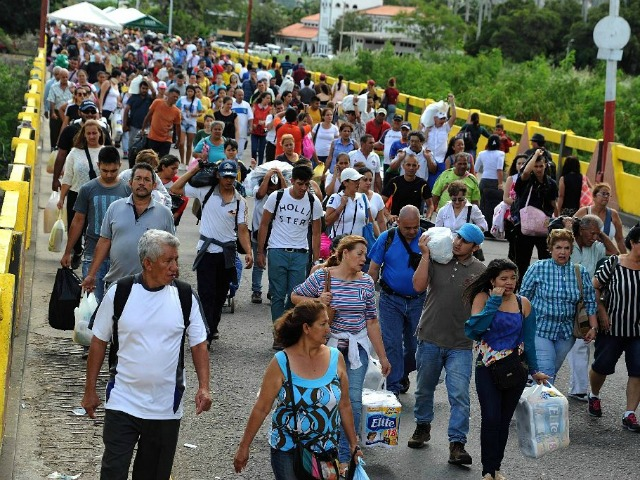The nations sharing a border with Venezuela, a country increasingly on the brink of civil war, are bracing for the influx of tens of thousands of refugees, most having crossed into Cúcuta, Colombia, and Roraima, Brazil.
This week, Brazilian officials told reporters the number of Venezuelans entering the country had already doubled from 2016, while Colombia has turned to studying the Syrian migrant crisis to better prepare themselves for new refugees. Colombia is home to the largest internally displaced population on the planet thanks to half a century of terrorism by the now-legalized Marxist Revolutionary Armed Forces of Colombia (FARC), making it a particularly ill-equipped country to receive the Venezuelans.
UN statistics released in July estimated that about 300,000 Venezuelans currently live in Colombia, but 25,000 are crossing into the border town of Cúcuta on a daily basis. Not all stay—many make day trips to buy flour, milk, and other needs unavailable on the other side of the border—but dictator Nicolás Maduro’s most recent power grab has Venezuelans coming in and not looking back.
Anticipating a deteriorating situation in the socialist dictatorship, Colombia sent some of its senior immigration officials to Turkey in May to visit Syrian refugee camps, according to a report in Colombia’s Caracol outlet. Turkey, the report claimed, “is willing to teach all they know.”
Turkey is currently housing three million refugees, mostly Syrians who the government of President Recep Tayyip Erdogan has repeatedly threatened to deploy into Europe. Erdogan has expressed interest in expanding his influence into Latin America—once claiming that Muslims discovered the Americas before Christopher Columbus—and has expressed support for Nicolás Maduro. Erdogan had stated his intention last year to visit Venezuela in early 2017, but the trip never materialized.
Erdogan’s government has stayed notably silent on Venezuela since July 30, when Maduro’s government staged a widely derided election whose results they had to doctor even though only socialist candidates were allowed on the ballot.
Meanwhile, the Colombian government has announced that it would “evaluate” the construction of a refugee facility on its border with Venezuela, while Brazil has faced significant strain on its education and social welfare systems due to an influx of Venezuelans. A report in Globo’s G1 publication this week revealed that 6,438 Venezuelans have made asylum requests in Brazil as of June 2017, compared to 230 in all of 2015 and 2,230 in 2016. Despite the fact that Roraima borders Venezuela’s inland Amazonas and Bolívar states, most of those documented as entering the country come from Caracas, on the nation’s northern coast. Most are young and male, G1 reports, and highly educated, saying, “Most are students (17.93 percent), followed by engineers (6.21 percent), doctors (4.83 percent) and economists (7.83 percent).”
These estimates are from June, as noted above. By early August, when the G1 report surfaced, police on the Brazilian border reported “hundreds” of Venezuelans lining up as early as 4:00 am local time to enter the country, with a significant spike in these numbers following the July 30 election.
There is little evidence that Brazil—burdened by its own socialist-created economic crisis—can handle this influx. Local reports note that only 37 Venezuelans have received refugee status in Brazil since 2013, both due to bureaucratic inability to process them and the fact that most Venezuelans cannot afford the 300 reais ($95.68, or 125,120,831.68 Venezuelan bolívars) to apply for asylum (that fee was waived this month). Roraima is also facing a growing shortage of teachers who understand Spanish and can, thus, educate the Venezuelan children coming through the border. The state is planning to integrate Spanish into its Portuguese-language educational curricula.
Roraima’s health care system, according to Human Rights Watch, is also suffering. “The unprecedented influx of Venezuelans is straining Roraima’s already overburdened public health care system and clogging Brazil’s system for processing asylum applications,” the NGO reported in April.
While Colombia and Brazil will likely remain the most popular destinations for fleeing Venezuelans, the nation’s growing diaspora has affected the globe. Venezuelans have fled in droves to places as diverse as the United States, Mexico, the Dominican Republic, Trinidad and Tobago, and Israel.

COMMENTS
Please let us know if you're having issues with commenting.